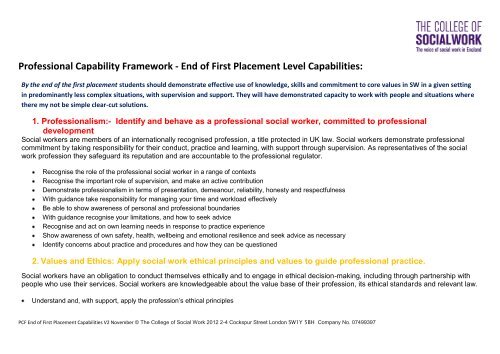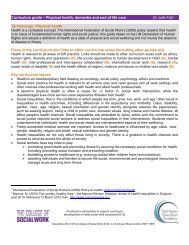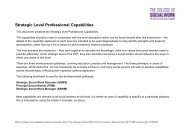PCF capabilities - end of first placement - The College of Social Work
PCF capabilities - end of first placement - The College of Social Work
PCF capabilities - end of first placement - The College of Social Work
You also want an ePaper? Increase the reach of your titles
YUMPU automatically turns print PDFs into web optimized ePapers that Google loves.
Pr<strong>of</strong>essional Capability Framework - End <strong>of</strong> First Placement Level Capabilities:<br />
By the <strong>end</strong> <strong>of</strong> the <strong>first</strong> <strong>placement</strong> students should demonstrate effective use <strong>of</strong> knowledge, skills and commitment to core values in SW in a given setting<br />
in predominantly less complex situations, with supervision and support. <strong>The</strong>y will have demonstrated capacity to work with people and situations wher e<br />
there my not be simple clear-cut solutions.<br />
1. Pr<strong>of</strong>essionalism:- Identify and behave as a pr<strong>of</strong>essional social worker, committed to pr<strong>of</strong>essional<br />
development<br />
<strong>Social</strong> workers are members <strong>of</strong> an internationally recognised pr<strong>of</strong>ession, a title protected in UK law. <strong>Social</strong> workers demonstrate pr<strong>of</strong>essional<br />
commitment by taking responsibility for their conduct, practice and learning, with support through supervision. As representatives <strong>of</strong> the social<br />
work pr<strong>of</strong>ession they safeguard its reputation and are accountable to the pr<strong>of</strong>essional regulator.<br />
Recognise the role <strong>of</strong> the pr<strong>of</strong>essional social worker in a range <strong>of</strong> contexts<br />
Recognise the important role <strong>of</strong> supervision, and make an active contribution<br />
Demonstrate pr<strong>of</strong>essionalism in terms <strong>of</strong> presentation, demeanour, reliability, honesty and respectfulness<br />
With guidance take responsibility for managing your time and workload effectively<br />
Be able to show awareness <strong>of</strong> personal and pr<strong>of</strong>essional boundaries<br />
With guidance recognise your limitations, and how to seek advice<br />
Recognise and act on own learning needs in response to practice experience<br />
Show awareness <strong>of</strong> own safety, health, wellbeing and emotional resilience and seek advice as necessary<br />
Identify concerns about practice and procedures and how they can be questioned<br />
2. Values and Ethics: Apply social work ethical principles and values to guide pr<strong>of</strong>essional practice.<br />
<strong>Social</strong> workers have an obligation to conduct themselves ethically and to engage in ethical decision-making, including through partnership with<br />
people who use their services. <strong>Social</strong> workers are knowledgeable about the value base <strong>of</strong> their pr<strong>of</strong>ession, its ethical standards and relevant law.<br />
Understand and, with support, apply the pr<strong>of</strong>ession’s ethical principles<br />
<strong>PCF</strong> End <strong>of</strong> First Placement Capabilities V2 November © <strong>The</strong> <strong>College</strong> <strong>of</strong> <strong>Social</strong> <strong>Work</strong> 2012 2-4 Cockspur Street London SW1Y 5BH Company No. 07499397
Recognise and with support manage the impact <strong>of</strong> own values on pr<strong>of</strong>essional practice.<br />
Identify and, with guidance, manage potentially conflicting values and ethical dilemmas<br />
Elicit and respect the needs and views <strong>of</strong> service users and carers and, with support, promote their participation in decision-making wherever possible<br />
Recognise and, with support, promote individuals’ rights to autonomy and self-determination<br />
Promote and protect the privacy <strong>of</strong> individuals within and outside their families and networks, recognising the requirements <strong>of</strong> pr<strong>of</strong>essional<br />
accountability and information sharing<br />
3. Diversity: Recognise diversity and apply anti-discriminatory and anti-oppressive principles in practice<br />
<strong>Social</strong> workers understand that diversity characterises and shapes human experience and is critical to the formation <strong>of</strong> identity. Diversity is multi-<br />
dimensional and includes race, disability, class, economic status, age, sexuality, g<strong>end</strong>er and transg<strong>end</strong>er, faith and belief. <strong>Social</strong> workers<br />
appreciate that, as a consequence <strong>of</strong> difference, a person’s life experience may include oppression, marginalisation and alienation as well as<br />
privilege, power and acclaim, and are able to challenge appropriately.<br />
Understand how an individual’s identity is informed by factors such as culture, economic status, family composition, life experiences and<br />
characteristics, and take account <strong>of</strong> these to understand their experiences<br />
With reference to current legislative requirements, recognise personal and organisational discrimination and oppression, and identify ways in which<br />
they might be challenged<br />
Recognise and, with support, manage the impact on people <strong>of</strong> the power invested in your role<br />
4. Rights, Justice and Economic Wellbeing:<br />
Advance human rights and promote social justice and economic well-being<br />
<strong>Social</strong> workers recognise the fundamental principles <strong>of</strong> human rights and equality, and that these are protected in national and international law,<br />
conventions and policies. <strong>The</strong>y ensure these principles underpin their practice. <strong>Social</strong> workers understand the importance <strong>of</strong> using and<br />
contributing to case law and applying these rights in their own practice. <strong>The</strong>y understand the effects <strong>of</strong> oppression, discrimination and poverty.<br />
Understand and, with support, apply in practice the principles <strong>of</strong> social justice, inclusion and equality<br />
Understand how legislation and guidance can advance or constrain people’s rights<br />
<strong>Work</strong> within the principles <strong>of</strong> human and civil rights and equalities legislation<br />
<strong>PCF</strong> End <strong>of</strong> First Placement Capabilities V2 November © <strong>The</strong> <strong>College</strong> <strong>of</strong> <strong>Social</strong> <strong>Work</strong> 2012 2-4 Cockspur Street London SW1Y 5BH Company No. 07499397
Recognise the impact <strong>of</strong> poverty and social exclusion and promote enhanced economic status through access to education, work, housing, health<br />
services and welfare benefits<br />
Recognise the value <strong>of</strong> indep<strong>end</strong>ent advocacy<br />
5. Knowledge: Apply knowledge <strong>of</strong> social sciences, law and social work practice theory<br />
<strong>Social</strong> workers understand psychological, social, cultural, spiritual and physical influences on people; human development throughout the life<br />
span and the legal framework for practice. <strong>The</strong>y apply this knowledge in their work with individuals, families and communities. <strong>The</strong>y know<br />
and use theories and methods <strong>of</strong> social work practice.<br />
With guidance apply research, theory and knowledge from sociology, social policy, psychology, health and human growth and development to social<br />
work practice<br />
Understand the legal and policy frameworks and guidance that inform and mandate social work practice, relevant to <strong>placement</strong> setting<br />
Understand forms <strong>of</strong> harm, their impact on people, and the implications for practice<br />
Apply knowledge from a range <strong>of</strong> theories and models for social work intervention with individuals, families, groups and communities, and the methods<br />
derived from them<br />
Value and take account <strong>of</strong> the expertise <strong>of</strong> service users and carers and pr<strong>of</strong>essionals<br />
6. Critical reflection and Analysis - Apply critical reflection and analysis to inform and provide a rationale for<br />
pr<strong>of</strong>essional decision-making<br />
<strong>Social</strong> workers are knowledgeable about and apply the principles <strong>of</strong> critical thinking and reasoned discernment. <strong>The</strong>y identify, distinguish,<br />
evaluate and integrate multiple sources <strong>of</strong> knowledge and evidence. <strong>The</strong>se include practice evidence, their own practice experience, service<br />
user and carer experience together with research-based, organisational, policy and legal knowledge. <strong>The</strong>y use critical thinking augmented by<br />
creativity and curiosity.<br />
Recognise the importance <strong>of</strong> applying imagination, creativity and curiosity to practice<br />
Inform decision-making through the identification and gathering <strong>of</strong> information from more than one source and, with support, question its reliability and<br />
validity<br />
With guidance use reflection and analysis in practice<br />
<strong>PCF</strong> End <strong>of</strong> First Placement Capabilities V2 November © <strong>The</strong> <strong>College</strong> <strong>of</strong> <strong>Social</strong> <strong>Work</strong> 2012 2-4 Cockspur Street London SW1Y 5BH Company No. 07499397
With guidance understand how to evaluate and review hypotheses in response to information available at the time and apply in practice with support<br />
With guidance use evidence to inform decisions<br />
7. Intervention and Skills: Use judgement and authority to intervene with individuals, families and communities to<br />
promote indep<strong>end</strong>ence, provide support and prevent harm, neglect and abuse<br />
<strong>Social</strong> workers engage with individuals, families, groups and communities, working alongside people to assess and intervene. <strong>The</strong>y enable<br />
effective relationships and are effective communicators, using appropriate skills. Using their pr<strong>of</strong>essional judgement, they employ a range <strong>of</strong><br />
interventions: promoting indep<strong>end</strong>ence, providing support and protection, taking preventative action and ensuring safety whilst balancing rights<br />
and risks. <strong>The</strong>y understand and take account <strong>of</strong> differentials in power, and are able to use authority appropriately. <strong>The</strong>y evaluate their own<br />
practice and the outcomes for those they work with.<br />
With guidance use a range <strong>of</strong> verbal, non-verbal and written methods <strong>of</strong> communication relevant to the <strong>placement</strong> With<br />
guidance communicate information, advice, instruction and opinion so as to advocate, influence and persuade Demonstrate the<br />
ability to build and conclude compassionate and effective relationships appropriate to the <strong>placement</strong> setting With guidance<br />
demonstrate an holistic approach to the identification <strong>of</strong> needs, circumstances, rights, strengths and risks<br />
Identify and use appropriate frameworks to assess, give meaning to, plan, implement and review effective interventions and evaluate the outcomes<br />
With guidance use a planned and structured approach, informed by at least two social work methods and models<br />
Recognise the importance <strong>of</strong> community resources, groups and networks for individuals<br />
Demonstrate skills in recording and report writing appropriate to the setting<br />
With guidance, demonstrate skills in sharing information appropriately and respectfully<br />
Demonstrate awareness <strong>of</strong> the impact <strong>of</strong> multiple factors, changing circumstances and uncertainty in people’s lives<br />
With guidance understand the authority <strong>of</strong> the social work role<br />
With guidance identify the factors that may create or exacerbate risk to individuals, their families or carers, to the public or to pr<strong>of</strong>essionals, including<br />
yourself<br />
With guidance identify appropriate responses to safeguard vulnerable people<br />
<strong>PCF</strong> End <strong>of</strong> First Placement Capabilities V2 November © <strong>The</strong> <strong>College</strong> <strong>of</strong> <strong>Social</strong> <strong>Work</strong> 2012 2-4 Cockspur Street London SW1Y 5BH Company No. 07499397
8. Contexts and organisations: Engage with, inform, and adapt to changing contexts that shape practice.<br />
Operate effectively within own organisational frameworks and contribute to the development <strong>of</strong> services and<br />
organisations. Operate effectively within multi-agency and inter-pr<strong>of</strong>essional partnerships and settings<br />
<strong>Social</strong> workers are informed about and pro-actively responsive to the challenges and opportunities that come with changing social contexts and<br />
constructs. <strong>The</strong>y fulfil this responsibility in accordance with their pr<strong>of</strong>essional values and ethics, both as individual pr<strong>of</strong>essionals and as members<br />
<strong>of</strong> the organisation in which they work. <strong>The</strong>y collaborate, inform and are informed by their work with others, inter-pr<strong>of</strong>essionally and with<br />
communities.<br />
With guidance, recognise that social work operates within, and responds to, changing economic, social, political and organisational contexts<br />
With guidance understand legal obligations, structures and behaviours within organisations and how these impact on policy, procedure and practice<br />
With guidance work within the organisational context <strong>of</strong> your <strong>placement</strong> setting and understand the lines <strong>of</strong> accountability<br />
Understand and respect the role <strong>of</strong> others within the organisation and work effectively with them<br />
Take responsibility for your role and impact within teams and with guidance contribute positively to team working<br />
Understand the inter-agency, multi-disciplinary and inter-pr<strong>of</strong>essional dimensions to practice and, with guidance, demonstrate partnership working<br />
9. Pr<strong>of</strong>essional Leadership: Take responsibility for the pr<strong>of</strong>essional learning and development <strong>of</strong> others through<br />
supervision, mentoring, assessing, research, teaching, leadership and management<br />
<strong>The</strong> social work pr<strong>of</strong>ession evolves through the contribution <strong>of</strong> its members in activities such as practice research, supervision, assessment <strong>of</strong><br />
practice, teaching and management. An individual’s contribution will gain influence when undertaken as part <strong>of</strong> a learning, practice-focused<br />
organisation. Learning may be facilitated with a wide range <strong>of</strong> people including social work colleagues, service users and carers, volunteers,<br />
foster carers and other pr<strong>of</strong>essionals.<br />
Identify how pr<strong>of</strong>essional leadership in social work can enhance practice<br />
Recognise the value <strong>of</strong> sharing and supporting the learning and development <strong>of</strong> others<br />
<strong>PCF</strong> End <strong>of</strong> First Placement Capabilities V2 November © <strong>The</strong> <strong>College</strong> <strong>of</strong> <strong>Social</strong> <strong>Work</strong> 2012 2-4 Cockspur Street London SW1Y 5BH Company No. 07499397












